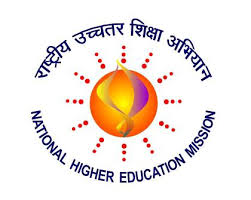Overview
Rashtriya Uchchatar Shiksha Abhiyan (RUSA) is a Centrally Sponsored Scheme (CSS), launched in 2013 aims at providing strategic funding to eligible state higher educational institutions. The central funding (in the ratio of 65:35 for general category States and 90:10 for special category states) would be norm based and outcome dependent. The funding would flow from the central ministry through the state governments/union territories to the State Higher Education Councils before reaching the identified institutions. The funding to states would be made on the basis of critical appraisal of State Higher Education Plans, which would describe each state’s strategy to address issues of equity, access and excellence in higher education.
Objectives
The salient objectives of RUSA are to;
- Improve the overall quality of state institutions by ensuring conformity to prescribed norms and standards and adopt accreditation as a mandatory quality assurance framework.
- Usher transformative reforms in the state higher education system by creating a facilitating institutional structure for planning and monitoring at the state level, promoting autonomy in State Universities and improving governance in institutions.
- Ensure reforms in the affiliation, academic and examination systems.
- Ensure adequate availability of quality faculty in all higher educational institutions and ensure capacity building at all levels of employment.
- Create an enabling atmosphere in the higher educational institutions to devote themselves to research and innovations.
- Expand the institutional base by creating additional capacity in existing institutions and establishing new institutions, in order to achieve enrolment targets.
- Correct regional imbalances in access to higher education by setting up institutions in unâ€served & underserved areas.
- Improve equity in higher education by providing adequate opportunities of higher education to SC/STs and socially and educationally backward classes; promote inclusion of women, minorities, and differently abled persons.
Components
RUSA would create new universities through upgradation of existing autonomous colleges and conversion of colleges in a cluster. It would create new model degree colleges, new professional colleges and provide infrastructural support to universities and colleges Faculty recruitment support, faculty improvements programmes and leadership development of educational administrators are also an important part of the scheme. In order to enhance skill development the existing central scheme of Polytechnics has been subsumed within RUSA. A separate component to synergise vocational education with higher education has also been included in RUSA. Besides these, RUSA also supports reforming, restructuring and building capacity of institutions in participating state.
Institutional Hierarchy
RUSA is implemented and monitored through an institutional structure comprising the National Mission Authority, Project Approval Board and the National Project Directorate at the centre and the State Higher Education Council and State Project Directorate at the state level.
Source: http://mhrd.gov.in/rusa
Implementation of RUSA at Govt Kolasib College
Programme Implementation Unit
| Chairman | Mr B.S. Thapa, Principal |
| Institutional Coordinator | Mr Thangchhuana Sailo, Associate Professor |
| Nodal Officer, Procurement | Dr C. Lalmuankima, Associate Professor |
| Nodal Officer, Academic Activities | Mr T. Zahmingliana, Associate Professor |
| Nodal Officer, Civil Works incl. Environmental Management | Mr Laltanpuia Rengsi, Associate Professor |
| Nodal Officer, Financial Aspects | Dr B.K. Mallik, Associate Professor |
| Nodal Officer, Equity Assurance Plan Implementation | Mr Christopher J.Z. Lawlor, Associate Professor |

















